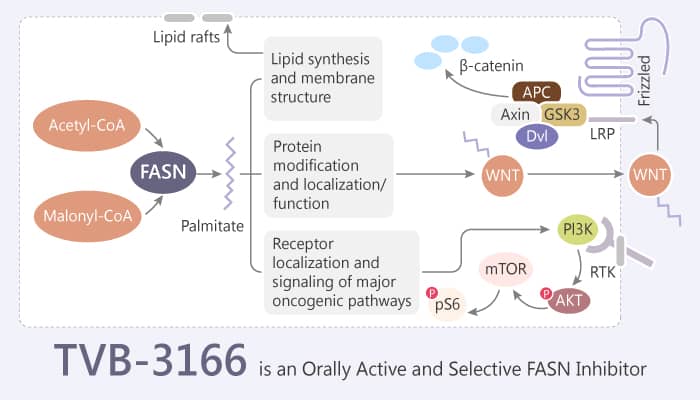Fatty acid synthases (FASN) are homodimers and multifunctional enzymes that catalyze palmitate biosynthesis in NADPH dependent reactions. FASN plays an important role in tumor cell biology and therapeutic response of various cancer types. In fatty acid synthesis, FASN consumes NADPH, acetyl coenzyme A and malonyl coenzyme A. The consumption of these substrates and the production of fatty acids contribute to constantly changing metabolic state required for tumor cell growth and survival. Besides, FASN inhibition may destroy the signal transduction network and biological process needed for cell growth, proliferation, stress response by destroying the membrane structure. Furthermore, FASN activity is closely related to receptor tyrosine kinase (RTK), PI3K-Akt-mTOR and MAPK signaling pathways. Meanwhile, selective FASN inhibition can achieve the desired antitumor effect without causing rapid weight loss associated with fatty acid oxidation activation. TVB-3166 is an orally-available, reversible, and selective FASN inhibitor with antitumor activity.

TVB-3166 is an orally-available, reversible, and selective fatty acid synthase (FASN) inhibitor with IC50s of 42 nM and 81 nM for FASN and cellular palmitate synthesis, respectively. Specifically, TVB-3166 induces apoptosis and inhibits in-vivo xenograft tumor growth. In addition, Dose-dependent effects are observed between 20–200 nM TVB-3166. And this agrees with the IC50 in biochemical FASN and cellular palmitate synthesis essay. Besides, TVB-3166 leads to selective death of tumor cells, without significant effect on normal cells. And it inhibits in vivo xenograft tumor growth in well-tolerated doses. Moreover, oral dosing of TVB-3166 modulates the target enzyme in vivo is well tolerated. And it inhibits mouse xenograft tumor growth in a dose-dependent manner. All in all, TVB-3166 is an orally-available, reversible, and selective FASN inhibitor with antitumor activity.
References:
Ventura R, et al. EBioMedicine. 2015 Jul 2;2(8):808-24.